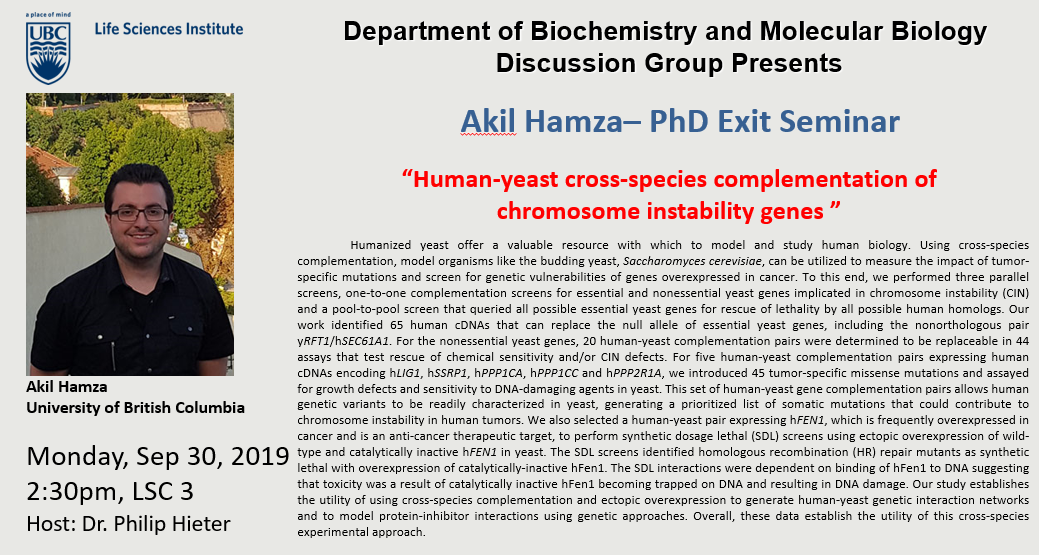
- This event has passed.
Department of Biochemistry and Molecular Biology Discussion Group: Akil Hanza – PhD Exit Seminar
September 30, 2019 @ 2:30 pm - 3:30 pm

The Department of Biochemistry and Molecular Biology Discussion Group presents a PhD exit seminar:
Akil Hamza
University of British Columbia
Date: Monday, September 30, 2019
Time: 2:30 PM
Location: LSC 3
Title:Human-yeast cross-species complementation of chromosome instability genes
Abstract: Humanized yeast offer a valuable resource with which to model and study human biology. Using cross-species complementation, model organisms like the budding yeast, Saccharomyces cerevisiae, can be utilized to measure the impact of tumor-specific mutations and screen for genetic vulnerabilities of genes overexpressed in cancer. To this end, we performed three parallel screens, one-to-one complementation screens for essential and nonessential yeast genes implicated in chromosome instability (CIN) and a pool-to-pool screen that queried all possible essential yeast genes for rescue of lethality by all possible human homologs. Our work identified 65 human cDNAs that can replace the null allele of essential yeast genes, including the nonorthologous pair yRFT1/hSEC61A1. For the nonessential yeast genes, 20 human-yeast complementation pairs were determined to be replaceable in 44 assays that test rescue of chemical sensitivity and/or CIN defects. For five human-yeast complementation pairs expressing human cDNAs encoding hLIG1, hSSRP1, hPPP1CA, hPPP1CC and hPPP2R1A, we introduced 45 tumor-specific missense mutations and assayed for growth defects and sensitivity to DNA-damaging agents in yeast. This set of human-yeast gene complementation pairs allows human genetic variants to be readily characterized in yeast, generating a prioritized list of somatic mutations that could contribute to chromosome instability in human tumors. We also selected a human-yeast pair expressing hFEN1, which is frequently overexpressed in cancer and is an anti-cancer therapeutic target, to perform synthetic dosage lethal (SDL) screens using ectopic overexpression of wild-type and catalytically inactive hFEN1 in yeast. The SDL screens identified homologous recombination (HR) repair mutants as synthetic lethal with overexpression of catalytically-inactive hFen1. The SDL interactions were dependent on binding of hFen1 to DNA suggesting that toxicity was a result of catalytically inactive hFen1 becoming trapped on DNA and resulting in DNA damage. Our study establishes the utility of using cross-species complementation and ectopic overexpression to generate human-yeast genetic interaction networks and to model protein-inhibitor interactions using genetic approaches. Overall, these data establish the utility of this cross-species experimental approach.
Hosted by: Dr. Phil Hieter